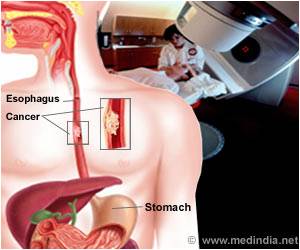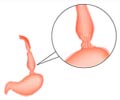Robotic-assisted transhiatal esophagectomy has shown better outcomes in terms of patient morbidity and reduced complications.

‘RATE is an effective and safe oncologic surgical procedure for the removal of lymph nodes in those with esophageal cancer.’





Progression-free (PFS) and overall (OS) survival were estimated. Postoperative complications commonly observed were nonmalignant pleural effusion (38%) and recurrent laryngeal nerve injury (33%); 30 day mortality rate was 2%. Robotic technology gives surgeons a better view during surgery and lymph nodes can be removed without additional incisions on the patient.
"Very few centers have adopted robots for this procedure because of the technical difficulties and unique skills that are needed by the surgeons and the operating room staff," says Daniel Dunn, M.D., a retired Allina surgeon and the study's principle investigator.
"But the robotic arms can turn and twist and reach more places than human hands will ever be able to."
Source-Eurekalert












